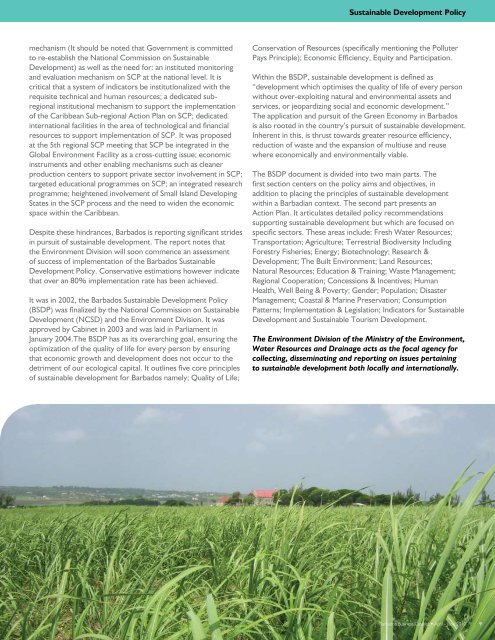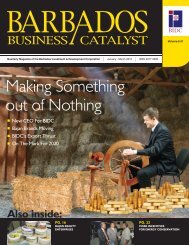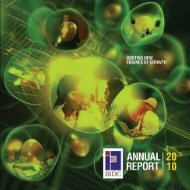Labour of Love - Barbados Investment and Development Corporation
Labour of Love - Barbados Investment and Development Corporation
Labour of Love - Barbados Investment and Development Corporation
You also want an ePaper? Increase the reach of your titles
YUMPU automatically turns print PDFs into web optimized ePapers that Google loves.
Sustainable <strong>Development</strong> Policy<br />
mechanism (It should be noted that Government is committed<br />
to re-establish the National Commission on Sustainable<br />
<strong>Development</strong>) as well as the need for: an instituted monitoring<br />
<strong>and</strong> evaluation mechanism on SCP at the national level. It is<br />
critical that a system <strong>of</strong> indicators be institutionalized with the<br />
requisite technical <strong>and</strong> human resources; a dedicated subregional<br />
institutional mechanism to support the implementation<br />
<strong>of</strong> the Caribbean Sub-regional Action Plan on SCP; dedicated<br />
international facilities in the area <strong>of</strong> technological <strong>and</strong> financial<br />
resources to support implementation <strong>of</strong> SCP. It was proposed<br />
at the 5th regional SCP meeting that SCP be integrated in the<br />
Global Environment Facility as a cross-cutting issue; economic<br />
instruments <strong>and</strong> other enabling mechanisms such as cleaner<br />
production centers to support private sector involvement in SCP;<br />
targeted educational programmes on SCP; an integrated research<br />
programme; heightened involvement <strong>of</strong> Small Isl<strong>and</strong> Developing<br />
States in the SCP process <strong>and</strong> the need to widen the economic<br />
space within the Caribbean.<br />
Despite these hindrances, <strong>Barbados</strong> is reporting significant strides<br />
in pursuit <strong>of</strong> sustainable development. The report notes that<br />
the Environment Division will soon commence an assessment<br />
<strong>of</strong> success <strong>of</strong> implementation <strong>of</strong> the <strong>Barbados</strong> Sustainable<br />
<strong>Development</strong> Policy. Conservative estimations however indicate<br />
that over an 80% implementation rate has been achieved.<br />
It was in 2002, the <strong>Barbados</strong> Sustainable <strong>Development</strong> Policy<br />
(BSDP) was finalized by the National Commission on Sustainable<br />
<strong>Development</strong> (NCSD) <strong>and</strong> the Environment Division. It was<br />
approved by Cabinet in 2003 <strong>and</strong> was laid in Parliament in<br />
January 2004.The BSDP has as its overarching goal, ensuring the<br />
optimization <strong>of</strong> the quality <strong>of</strong> life for every person by ensuring<br />
that economic growth <strong>and</strong> development does not occur to the<br />
detriment <strong>of</strong> our ecological capital. It outlines five core principles<br />
<strong>of</strong> sustainable development for <strong>Barbados</strong> namely; Quality <strong>of</strong> Life;<br />
Conservation <strong>of</strong> Resources (specifically mentioning the Polluter<br />
Pays Principle); Economic Efficiency, Equity <strong>and</strong> Participation.<br />
Within the BSDP, sustainable development is defined as<br />
“development which optimises the quality <strong>of</strong> life <strong>of</strong> every person<br />
without over-exploiting natural <strong>and</strong> environmental assets <strong>and</strong><br />
services, or jeopardizing social <strong>and</strong> economic development.”<br />
The application <strong>and</strong> pursuit <strong>of</strong> the Green Economy in <strong>Barbados</strong><br />
is also rooted in the country’s pursuit <strong>of</strong> sustainable development.<br />
Inherent in this, is thrust towards greater resource efficiency,<br />
reduction <strong>of</strong> waste <strong>and</strong> the expansion <strong>of</strong> multiuse <strong>and</strong> reuse<br />
where economically <strong>and</strong> environmentally viable.<br />
The BSDP document is divided into two main parts. The<br />
first section centers on the policy aims <strong>and</strong> objectives, in<br />
addition to placing the principles <strong>of</strong> sustainable development<br />
within a Barbadian context. The second part presents an<br />
Action Plan. It articulates detailed policy recommendations<br />
supporting sustainable development but which are focused on<br />
specific sectors. These areas include: Fresh Water Resources;<br />
Transportation; Agriculture; Terrestrial Biodiversity Including<br />
Forestry Fisheries; Energy; Biotechnology; Research &<br />
<strong>Development</strong>; The Built Environment; L<strong>and</strong> Resources;<br />
Natural Resources; Education & Training; Waste Management;<br />
Regional Cooperation; Concessions & Incentives; Human<br />
Health, Well Being & Poverty; Gender; Population; Disaster<br />
Management; Coastal & Marine Preservation; Consumption<br />
Patterns; Implementation & Legislation; Indicators for Sustainable<br />
<strong>Development</strong> <strong>and</strong> Sustainable Tourism <strong>Development</strong>.<br />
The Environment Division <strong>of</strong> the Ministry <strong>of</strong> the Environment,<br />
Water Resources <strong>and</strong> Drainage acts as the focal agency for<br />
collecting, disseminating <strong>and</strong> reporting on issues pertaining<br />
to sustainable development both locally <strong>and</strong> internationally.<br />
<strong>Barbados</strong> Business Catalyst • April - June 2010<br />
9









